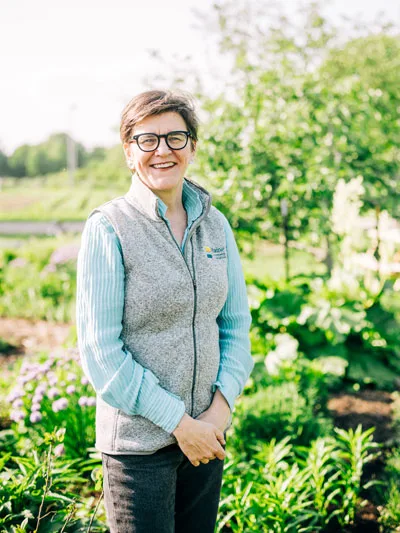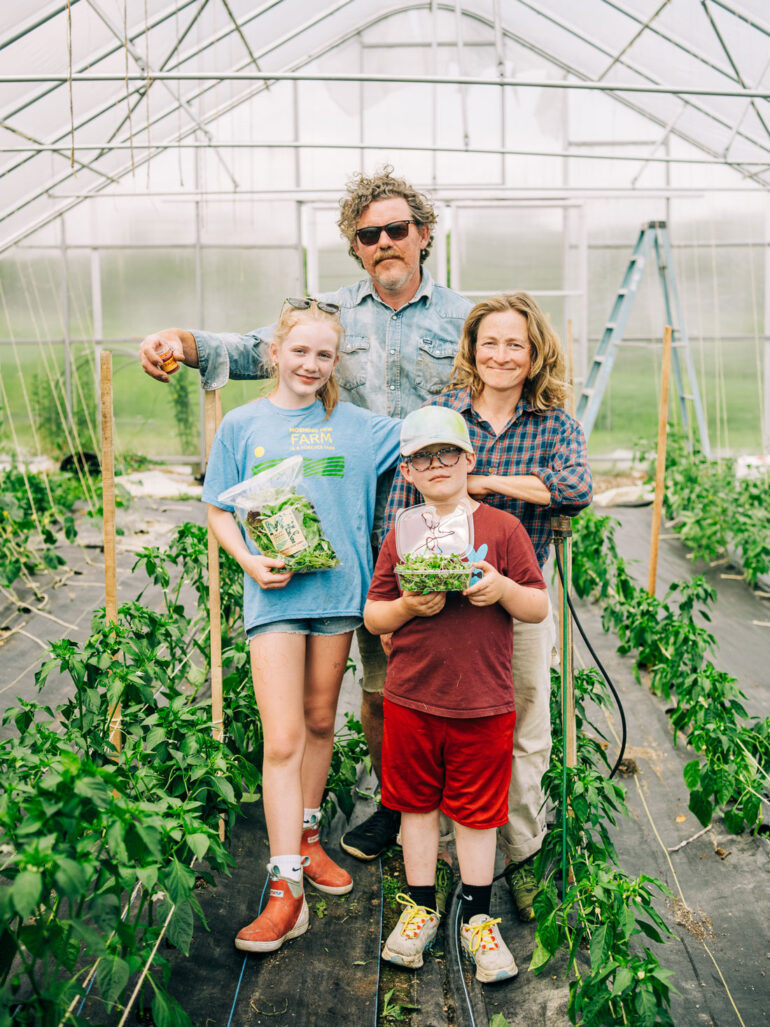 Maine Community Foundation
Maine Community FoundationIn 2011, Maine Farmland Trust acquired a former farm being eyed for a big-box development in Damariscotta, placed it under a permanent agricultural conservation easement, and re-sold it to Brady Hatch and Brendan McQuillen. The young couple established Morning Dew Farm, with a mission to grow high-quality certified-organic greens and seedlings for local residents, chefs, and grocers.
The trust purchased the land through its Buy/Protect/Sell program, which buys farms at risk of falling out of agriculture and finds new farmers to work it. Piloted in 2007, the program scaled significantly the following year, thanks to a $1,000,000 investment loan from Maine Community Foundation. MaineCF pooled financial resources from various donors to support local initiatives. “We have thousands of donors and a real democratization of philanthropy,” says MaineCF president and CEO Deborah Ellwood.

MaineCF is the largest community foundation in the state, and with its partners has contributed $128 million to Maine conservation, environment, climate, and resilience efforts since its founding, in 1983. Other grantees include Maine Coast Heritage Trust, The Nature Conservancy, Gulf of Maine Research Institute, Natural Resources Council of Maine, and many smaller organizations and networks working in communities across the state.
Hatch and McQuillen farmed on leased land for 14 years, and are now in their seventh year as farm owners — a success story not unique to Morning Dew Farm. “MFT’s biggest bucket of dollars is used to purchase agricultural conservation easements from landowners to keep farmland permanently protected,” organization president and CEO Stacy Brenner says. Along with reducing the property’s price, the conservation easements can help fund retirement for aging farmers. With support from MaineCF and other investors, the trust has so far protected 57,289 acres of farmland, spanning 392 easements in all 16 counties.
For Brenner, the funding support secured through MaineCF feels personal. Brenner and her husband moved to Maine specifically because of the robust support services available to first-generation farmers and ended up finding their second and third farm properties through FarmLink, an MFT service. They also tapped into the organization’s business planning and technical assistance services. Today, Brenner’s husband runs their farm, while Brenner serves as a state senator in addition to her role at MFT. She is also the former chair current committee member of the Maine State Legislature Environment and Natural Resources Committee and the Senate appointee to the Maine Climate Council, of which Ellwood is also a member.
In addition to the Maine Climate Council, Ellwood served as representative of the philanthropic sector on Maine’s Infrastructure Rebuilding and Resilience Commission, which reviewed and evaluated Maine’s response to the recent storms and delivered a long-term resilience plan for the state this past May. “Environmental work is something MaineCF has been supporting for over 40-plus years, so we were perfectly positioned to do more,” Ellwood says. “In addition to working with philanthropists to provide grants to environmental groups, we are now working more closely with a broad range of community leaders to advance the work. It made sense for me to participate in these two entities to help improve outcomes for people throughout Maine.”
A former member of the Maine Climate Council, Sandy Buck, has long supported MaineCF’s efforts. Buck first came to Maine as a 9-year-old attending Camp Kieve. “That was my introduction to running rivers, climbing mountains, and being outside all day long,” he says. “It was a life-shaping experience.” Buck later joined Camp Kieve’s board of directors, and after a career working in independent schools in Massachusetts, convened a family meeting to present the idea of starting a foundation. Leveraging fundraising experience gained on Camp Kieve’s board, Buck hoped his family’s Horizon Foundation would help move the dial on issues they felt passionate about. For him, that cause was the environment.
In 2006, Buck and his wife returned to Maine to live. Around that same time, his like-minded friend and Cape Elizabeth resident Bo Norris reached out to talk about the causes each were supporting, where there might be alignment, and if they might be able to make a collective impact. Norris started the Environmental Funders Network in 2008. Buck served as a founding member, and MaineCF hosted the group for the next 15 years. “With help from MaineCF we identified individuals who were either donor-advised fund holders or staff members of foundations that focused on environmental issues,” Buck says. “We had a cohort of people devoted to land conservation, watershed protection, and climate action.”
The Environmental Funders Network is now hosted by the Maine Philanthropy Center, but Buck’s involvement with MaineCF is still strong. In 2019, MaineCF established the Maine Climate Leadership Fund in partnership with Buck to support Maine’s climate policy leadership and activities. The fund has since given $1.7 million to directly support the work of the Maine Climate Council, enhancing the limited state funds available.
“We’ve got an amazing history of doing work in this area, but we’re not only looking back, we are looking forward,” Ellwood says. “We’re going to be engaging more and more people in how we can improve the resilience of communities across the state. We’re really optimistic about what the future looks like in Maine.”




